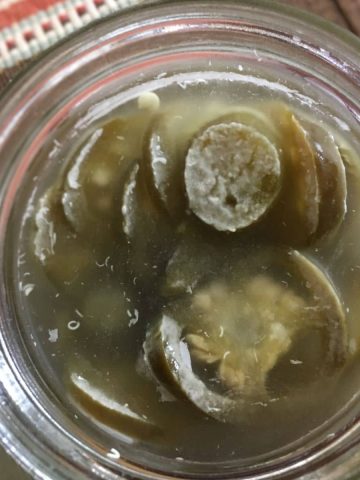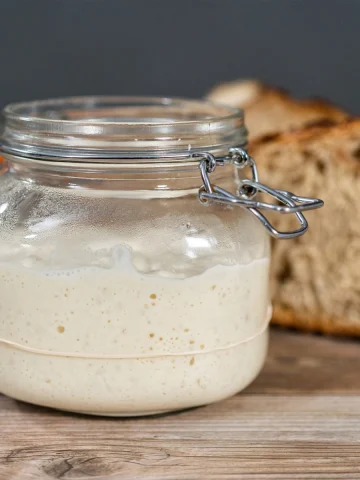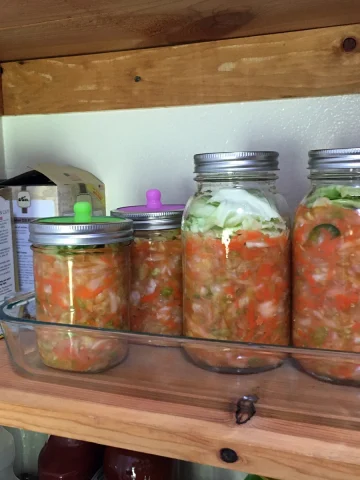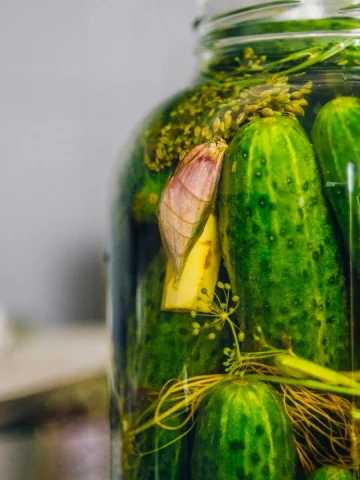Fermentation Time For Sauerkraut
The longer a batch of sauerkraut ferments, the more tangy and sour the flavor. We recommend fermenting sauerkraut for at least ten days to reach the tasty tart flavor and at least sixty days for the full probiotic health benefits.
Tip: After seven days, begin tasting the sauerkraut. Use a clean fork to remove some sauerkraut from the jar or crock. Once the flavor and crunch factor reaches the desired level, halt the process by moving the jars to the refrigerator.
However, if you want a deeper, tangy sour flavor, let the sauerkraut ferment for around twenty days. Taste test it once a week till it reaches your desired flavor.
How Long to Ferment Sauerkraut for Probiotics?
Fermenting sauerkraut for a full sixty days gives it time to go through all the stages of fermentation and produce friendly or ‘probiotic’ bacteria.
This time frame is very fluid because it depends on several factors, the temperature, the amount of salt in the brine, and the ability to keep the sauerkraut below the brine or in an anaerobic environment.
Ultimately, waiting for the full 60 days is not required. You can always put the sauerkraut in the refrigerator when it has reached the consistency you like.
After you read a few recipes for making sauerkraut, you will see that the time recommended for a successful fermentation is all over the place. Some say it's ready in as little as three days, while others recommend waiting up to 10 weeks.
None of these answers are wrong. It comes down to what you want out of your sauerkraut.
If it's crunch and tangy taste, then ten days will most likely be long enough for you.
If you like the sour sauerkraut, give it more time, 15-20 days.
If you want the full-on health benefits of probiotics, then waiting at least sixty days is recommended.
According to the book Handbook of Fermented Food by ER Farnworth, fermenting sauerkraut takes at least 60 days.
In his book, The Art Of Fermentation: An In-Depth Exploration of Essential Concepts and Processes from Around the World (click to see the current price on Amazon), Sandor Katz agrees with the sixty-day time frame too. However, he references three phases, while ER Framworth calls it four stages. Either way, it still takes about two months for sauerkraut to fully develop into a probiotic-rich gold mine.
If you are fermenting vegetables for health benefits, give the fermentation process at least 60 days to get there.
The stages of Sauerkraut Fermentation
If you are making sauerkraut for health benefits, it is wise to let it go through all four phases.
The first phase happens in the first 2 -3 days. The aerobic microorganisms (Pseudomonas, Flavobacterium, and Acinetobacter) quickly consume oxygen. This is why it is essential to pack the cabbage tightly, to get all the extra air out of the vessel before sealing it off.
Raw cabbage contains only a tiny percentage of LAB, 0.5-1.5% of the total microbial population. As the cabbage goes through the four phases, this tiny percentage grows and dominates as it progresses.
The second phase occurs between days 3 - 6, depending on the temperature. More bacteria start to grow and take over. When three things happen: the pH level lowers, causing an anaerobic environment, combined with the proper brine concentration. During this stage, you will see bubbles forming in the sauerkraut, both below the brine and on the surface.
During the second phase, microorganisms produce lactic and acetic acids, which further drop the pH. During this phase, the color of the cabbage changes and stabilizes vitamin C.
In the third phase, many carbohydrates are fermented into lactic acid due to other bacteria taking over called homofermentative lactobacilli. During this stage, The pH will be around 3.8-4.1.
In the last phase, Lactobacillus Brevis and other organisms will ferment sugars that were released during the previous phases of fermentation. The pH can drop as low as 3.4, which is recommended.
How Temperature Affects Fermentation of Sauerkraut
A temperature range of 65-72° Fahrenheit (18–22° Celsius) is ideal for fermenting vegetables, including cabbage. And if you can keep the average temperature within 5° Fahrenheit (3° Celsius), even better.
If temperatures are warmer than 72, try fermenting for a shorter period. Likewise, if temperatures are cooler, it will take longer for the sauerkraut to ferment.
Veggies that ferment under warm conditions can turn soft and slimy; under cooler temps (60°-70°/15°-20°C), they stay crisp.
Did I cover all you wanted to know about how long it takes to ferment sauerkraut?
There are a lot of factors that come into play with the timing of fermenting vegetables.
In review:
- How do you like your sauerkraut?
- The stages of fermentation that sauerkraut go through
- How warmer temperatures affect fermenting
- How cooler temperatures affect fermenting
- How salt ratio affects fermenting
But mostly, we explored how long it takes for sauerkraut to ferment? The answer to that question comes down to what you want from your sauerkraut.
If it’s crunch and tangy taste, then ten days will most likely be long enough for you.
If you like the sour sauerkraut, give it more time, 15-20 days.
If you want the full-on health benefits of probiotics, then waiting at least sixty days is recommended.
Have more questions about fermenting sauerkraut and other vegetables? Check out these related articles, and Happy Fermenting!




